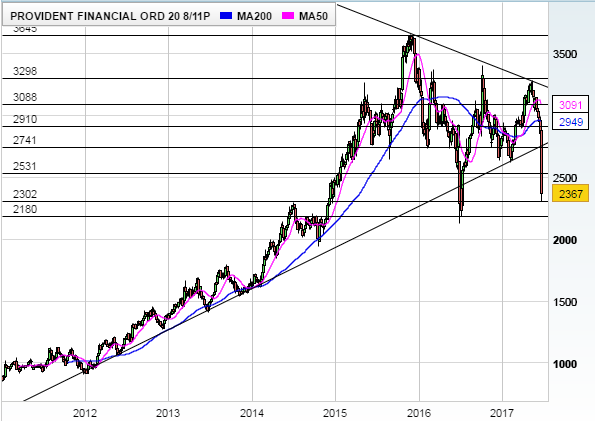Woodford stunned by Provident Financial crash
21st June 2017 13:52
by Lee Wild from interactive investor
Share on
Being a star fund manager has its perks. Neil Woodford is idolised by hoards of investors and isn't short of a few bob, but there is a downside when you're in the public eye and running a fund with long-term objectives.
You're feted by the investment community when things go right, but slip-ups – and they happen to every investor – are magnified. It happened to Woodford with – currently loitering near record lows – and with support services struggler and high street bellwether .
had a stinker in 2015, too, but the support services giant has more than doubled in value since. And, as we reported last week, fund rating service Fund Calibre places top of the Investment Association's (IA) UK Equity Income fund sector.
Between 2 June 2014 and 5 June 2017, it's returned 39%. Net asset value of is down modestly since launch too, and performance hasn't been great at his new UK equity income fund.
And there was more unwelcome news Wednesday, this time at sub-prime lender , which, at the end of May was the Equity Income fund's fourth-largest holding at 5.5%. It was third-largest in his new Income Focus fund at 4.4%.
In its latest trading update, not released until 5.35 yesterday evening, Provident chief executive Peter Crook warned of a big hit to profits due to "higher-than-expected operational disruption from the migration of the home credit business to a new operating model".
Issuing the warning an hour after the market closed didn't save the shares from a pasting at the first available opportunity, however.
Already down to £28.65 from almost £33 a month ago, Provident plummeted a further 20% first thing Wednesday to within a whisker of £23. It's now back to levels last seen in the aftermath of last summer's Brexit vote.
According to Provident's website, last updated on 31 May, Woodford Investment Management (UK) owned 18.71% of the former £4 billion company. That puts the hit to Woodford today at almost £156 million.

Of course, Crook is "disappointed", but he's sticking by the strategic rationale of the home credit decision, which involves transitioning the Consumer Credit division (CCD) from being serviced through self-employed local agents to employing full time customer experience managers – about 2,500 have been recruited.
And Provident blames "reduced agent effectiveness" for this warning, with too few agents working on home collections.
We'd already been told at a capital markets day in April that this would cause a £15 million shortfall. Now, after a poor May, it'll be more like £40 million. Now most of the field based roles have been filled, things are improving, but the rate of collections will not begin to normalise until next month.
It's also been harder selling to existing customers and keeping them on the books, causing a £37 million drop in credit issues versus last year. As the focus from here will be more on collections, profits are likely to come under further pressure.
In all, pre-exceptional profits at CCD will slump to around £60 million, we're told, from £115 million in 2016.
"This is one of the most breathtakingly overvalued lenders I have come across," cries finnCap analyst Jeremy Grime.
And at Cenkos Securities, Rae Maile admits that a big slip-up by this normally reliable profit generator will be "challenging for the market to cope with". He's cut profit estimates for 2017 by £50 million, or 15%, then by £37 million (9%) for 2018, and £28 million (6%) in 2019.
"There should be no reason to doubt the dividend, but the estimated rate of growth will surely be lower," he says. "We have reduced our current year dividend per share estimate to 140p (from 145p) giving growth of 4% with no increase assumed at the interim stage this year."
But Maile has a view on where value kicks in. He points out that if the share price fall matches the current year profit downgrade – 15% - the estimated yield for 2017 would be 5.7% "at which point there would be clear value we believe".
"Our 'buy' recommendation at the closing price on 20 June will be shown to have been wrong in the short term, without doubt. But we have confidence that in the passage of time any set back now will have proven to be a welcome opportunity to buy the shares."
Management must make this change work, and rebuild trust. If they do, and the rest of the business continues to trade in line with expectations, the dividend should be safe, even though it temporarily drops below management's target minimum cover of 1.25 times, equivalent to a pay-out ratio of 80%.
It's likely why investors have heeded Cenkos's advice and piled in at lower levels – Provident now trades down 16% at £23.90. That puts them on a forward price/earnings (PE) ratio of just under 16 times and yielding 5.8%.
Also worth noting perhaps is the potential positive read across to smaller rivals and . Both are "well positioned to capitalise by picking up former Provident agents and taking market share in areas where Provident agencies have been vacated", says broker Shore Capital. A "great opportunity", adds Grime.
This article is for information and discussion purposes only and does not form a recommendation to invest or otherwise. The value of an investment may fall. The investments referred to in this article may not be suitable for all investors, and if in doubt, an investor should seek advice from a qualified investment adviser.